#Anglo-Chinese War
Text



faces :;
#why does she look so pissed ruh#twdg#The Second Opium War#also known as the Second Anglo-Chinese War#the Second China War#the Arrow War#or the Anglo-French expedition to China#was a colonial war lasting from 1856 to 1860#which pitted the United Kingdom#France#and the United States against the Qing dynasty of China.#louis twdg#tenn twdg#clementine twdg#violet twdg#stuff
12 notes
·
View notes
Text
For a bit of context to Mizu’s situation- she is going to travel to London in the year 1657
Right now, it isn’t the English who were doing the big trade in Japan or wider Asia, it was the Dutch and Portugese.
The Edo period of isolation is going to last for another 200 years.
The first Chinese person to enter England (at least, on record) won’t be for near another 30 years in 1685.
Tea hasn’t even reached England yet. The first shipment will arrive through Holland’s trade with China at about 1658.
This is the time of Oliver Cromwell, the Anglo-Spanish War, and England’s colonization of the Americas and is still beginning to claw itself into India.
Mizu cannot speak English (I hope she can barter for Fowler to teach her some in this months long voyage), certainly isn’t white passing, and is going to an England that would not be familiar with a foreign presence at all.
This is feels like a horrible trap that leaves her horribly dependent on a foul person and both highly noticeable and ‘exotic’. Like I really am interested if concerned to see where and how this can go.
#like language barrier alone how is she not gonna be isolated and without any ally or actual way to figure anything out#blue eye samurai#mizu blue eye samurai#once hes in England Fowler can just leave her to wolves so easily like whats his goal here#and then the very bad racial element like poor Pocahontas was kidnapped and christianized only 30 years before#i keep having to remind myself this is the 1600s and not 1800s like there wont be any Indian people in England just frill collars
61 notes
·
View notes
Note
I believe this has to be asked at some point, what is Antonio and Piri's relationship like?
Our internalized racism (thanking Spain for uniting the ethnolinguistic groups to form the PH, Islamophobia and prejudice against Indigenous people, desiring Western validation too much, viewing ourselves as not Southeast Asian enough due to Catholicism overpowering Hindu-Buddhism, etc.) toxic machismo (patriarchy and all its consequences and misogyny and the huge support for authoritarian politicians), hypocrisy (of the Church and everything else), and a lot more can trace its roots from the Spanish colonization of the Philippines
But for Spain, era solo otro día.
The Philippines was not Spain's most profitable colony, and there are even instances of people saying it's a waste of money. Credit goes to @sweaty-clouds for these excerpts:
With the constant typhoons that damage crops and the lack of spices which Indonesia is blessed with (to be fair, Mindanao had cinnamon but Spain failed to conquer most of it.), the Philippines was better off as a trading hub for Chinese goods bound for Acapulco and Europe. Ultimately, it was the missionaries that insisted on keeping the country (that's another can of worms), and in terms of foreign policy, and the Spanish empire needs to have a hold in Asia.
I can imagine Antonio comparing Piri constantly with his peers and being disappointed but still keeping him for Christianity's sake. He rarely visits him and leaves all the work to Mexico (Nueva España, then) until Mexico became independent and Suez Canal was opened which made travelling from Sp to Ph became faster.
Piri would ask how come his neighbors are productive and Antonio would blame him for being lazy rather than Spain's late industrialization and dependence on the mining of silver and gold in exchange for Chinese goods.
Jose Rizal criticized this Spanish style mercantilism: While we see all the walls of London covered with advertisements of the products of its colonies, while the English make heroic efforts to substitute Ceylon tea for Chinese tea, they themselves begin with the sacrifice of their taste and their stomach; in Spain, with the exception of tobacco, nothing from the Philippines is known: neither its sugar nor coffee, hemp nor fine cloths, nor its Ilocano blankets . . . . The most commercial and most industrious countries have been the freest countries: France, England and the United States prove this. Hongkong, which is not [equal to] the most insignificant [island] of the Philippines, has more commercial movement than all the islands together, because it is free and is well-governed.
But I am in no way an Anglo-Saxon apologist. They are fcked up too. This has to be pointed out because there were instances in PH history where some Filipinos would rather be a British colony in the belief that the success of Hongkong and Singapore can be imitated!
The PH economy did become less restrictive when Spain lost its colonies in the Americas (deserve!). Many were afforded the right to study in Europe, hence, the ilustrados and enlightened thinkers like Jose Rizal, Marcelo del Pilar, etc. With enlightenment, comes the desire to be independent.
So, Antonio tries to be . . . more amiable with Piri. Piri appreciates it since he wants his respect but he wants equal status (as he should), equal rights, and often criticizes the church. Little Piri wanted to be the favourite and would often pray the rosary and the novena, hoping it would make him the apple of Antonio's eyes, but teenage Piri ain't taking any shit anymore because if God exists, they would favor David and not Goliath.
Then there's the Spanish-American war.
Now I heard Spain was more sentimental about losing Cuba (whether it's real life or Hetalia canon). There's the Generation '98, but it was never about Piri alone. It was about the fallen empire. Their relationship remains strained throughout the 20th century, especially when some upperclass Mestizo families in the Philippines supported Franco and were leaning towards the Axis powers, but the Philippines was trying to take in more Jewish refugees. Learning the Spanish language was also no longer required, and more attention was given to learning English since there's more job opportunities (and also, Hollywood).
Perhaps in the recent decade, Piri and Antonio are more cordial and diplomatic for the sake of trade relations and business. The Arroyo administration was active in that regard. Filipinos, nowadays, would joke about fighting Spaniards and while we do acknowledge the lingering colonial mentality and how fcked up colonialism is, we're not hostile to Spaniards. There's also this anecdote from a former teacher and her interaction with a Spaniard who said something along the lines of, "I learned about what Spain did to the Philippines, and I'm sorry. But it was the Castillans who did it! Not me, I'm from Catalonia."
But since Piri (and Filipinos) is canonically sassy, he would have visited Antonio in the midst of his financial crisis and asked, "Can I get a discount in Zara as colonial reparations?"
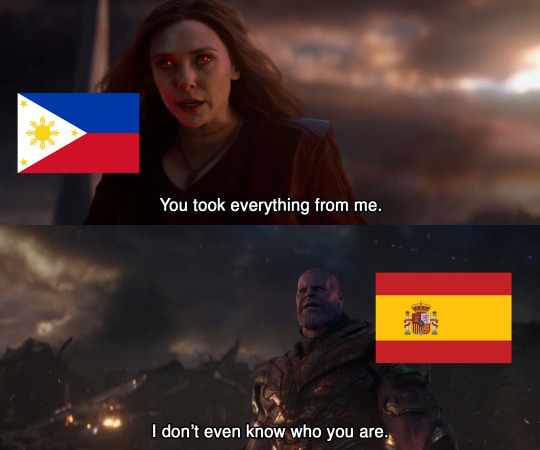
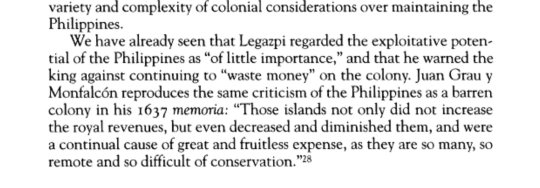
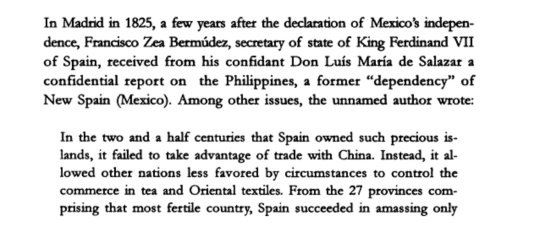
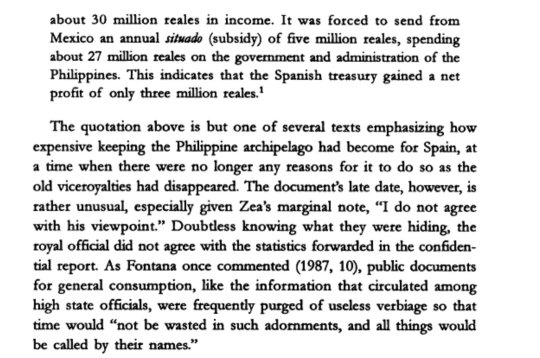
#i don't hate Antonio!! I just love to bully him#and my headcanons would be a lot more friendly towards Antonio if this was SpaPhil#hetalia#hws philippines#hws spain#and I am genuinely asking for discounts on Spanish businesses as colonial reparations
40 notes
·
View notes
Text
Khukurī (kukri) types and accessories
[a compilation of articles by Peter Dekker, Mandarin Mansion Antiques, 2020; text and photographs licensed under a Creative Commons Attribution 4.0 International License]
The Khukurī (खुकुरी )
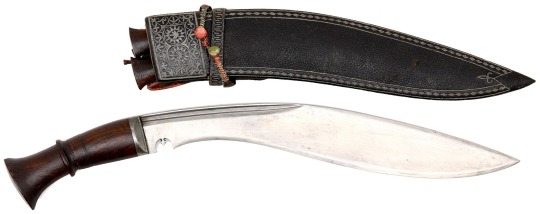
A Nepalese khukurī, 1850s
The khukurī (खुकुरी) is the traditional utility and fighting knife of Nepal. It is strongly associated with the Ghurkas, a Nepalese soldier class. Khukurī are characterized by a forward curving blade that widens considerably before forming a fairly sharp point.
The knife goes by many names, but the best-established names and their romanization are khukurī (खुकुरी ) and the simpler khukri (खुक्रि), both appear in comparative and etymological dictionary of the Nepali language of 1931. [1] The simplified word kukri is in common use today, mainly among English speaking collectors.
18th century
The first few reliable images we get of early khukurī are two 18th century pieces, exhibiting striking similarities even though one is in a Chinese collection and the other was illustrated by an English expedition party.
First, an 18th-century khukurī that appears in the Palace Museum collection in Beijing.1 It was probably captured in battle or presented during the signing of a treaty during the Tibet-Ghurka conflicts of 1788-1792.
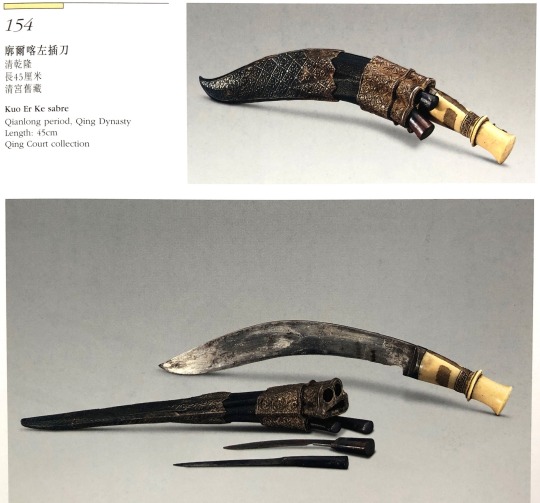
Khukurī in the Palace Museum collection, Beijing.
The relatively narrow handle with minimal flare in the pommel is also seen on Kirkpatrick's depiction of the khukurī, the first such illustration to appear in European sources.
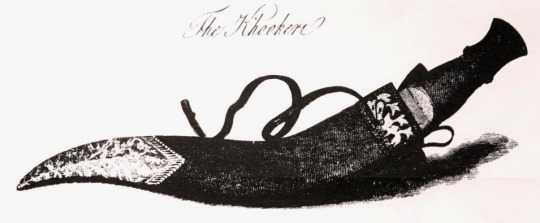
Early illustration of a khukurī. From Colonel Kirkpatrick's 1793 account of Nepal.
Another early piece, most likely the late 18th century, was obtained by Lord Egerton in 1855. It was published in his book Indian and Oriental Arms and Armour and is now in the Victoria & Albert Museum. V&A accession number: 3095(IS).

One of the Egerton khukurī
This piece has some early features like the shallow kauro (notch), and the overall form of hilt and blade. The workmanship looks Indian, and it may have been made by Indian craftsmen.
19th century
Some well known early 19th-century depictions of khukurī are in the Fraser Album. A few of them were actually made, commissioned by William Fraser (1784-1835), a late Mughal era British India civil servant in Delhi.

"Nepali soldiers" from the Fraser Album, published 1819.
Notable features seen on khukurī in these drawings are:
Long hilts with gently flaring pommels
Black enbroidered scabbards with small chape
A recurved shape to the scabbard
Types
Hanshee khukurī (हँसिया खुकुरी)
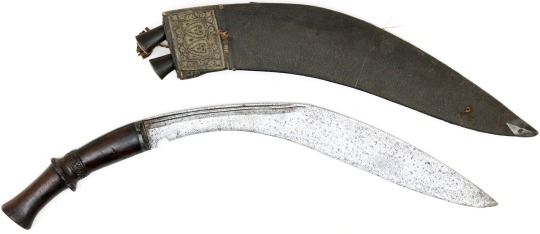
The hanshee khukurī or simply hanshee is an early type of khukurī that is characterized by having a long hilt and a rather long and relatively narrow blade with a strong curve. Other than most types of khukurī which double as fighting and utility knife, the hanshee appears to have been purely used as a weapon.
The word hanshee derives off the Nepali word hamsiyā (हँसिया) meaning "sickle". Another term used is lambendh, which supposedly means "long handle" containing the word lambe (लम्बे) meaning "long" in Nepali.
The hanshee appears to have been most popular in the late 18th and early 19th century and seems to have fallen out of use by the mid 19th century. Khukurī researcher V.K. Kunwor of Ghurka antiques writes about the hanshee: "These Kukri knives were very popular in the unification period of Nepal (1750-1770) and continued to be used in the Anglo-Nepal War 1814-1816 and up till the Indian Mutiny 1857, from whence it declined in popularity." He also writes that one of the defining features is a handle length of at least 13 cm.
Budhunē khukurī (बुधुने खुकुरी)

The fat-bellied budhunē khukri (bottom) compared to a more conventionally proportioned khukri (top)
Budhunē khukurī (बुधुने खुकुरी) is the name of a variation of khukri with a short, broad blade. It is a term that appears in the Comparative and etymological dictionary of the Nepali language of 1931.
Bhojpure subtype: The term Bhojpure turns up in John Powell's unfinished manuscript on the khukurī. Powell notes that it is a term later in use for the earlier budhun�� type.
Well known khukurī researcher Viking Kunwor, writing in 2020 adds: "The Bhojpure (from a town (Bhojpur) in the mid hills of eastern Nepal) is one of several styles within the larger Budhume group (a term which is a based on a broad bellied fish spieces). The many tribes can be attributed to these weapons such as Limbus and Rais make only the deeper bladed Bhojpure, the Gurungs, Tamangs and Chhetris make the seerpat and the Newars are the artisans who are responsible for many of the finely carved wooden scabbards, intricate decoration and engraved blades."
Sirupātē khukurī (सिरुपाते खुकुरी)
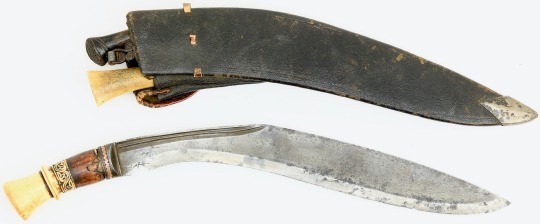
A sirupātē khukurī of the early 1800s.
Sirupātē (सिरुपाते) is a word commonly used to describe a long, slender version of a Nepalese khukurī.
The word sirupātē (सिरुपाते) appears in Ralph Lilley Turner’s A Comparative and Etymological Dictionary of the Nepali Language of 1931 and is described as: "सिरु-पाते siru-pāte,adj. Long and slender like a blade of siru"
Siru (सिरु) is the name of a local plant. Pātē (पाते) means "leaf". Turner gives the meaning for siru (सिरु) as the name of two varieties of grass or reed: (1) Imperata arundinacia (= khar-siru, used for thatching); (2) Imperata arundinacia var. latifolia. (Another possibility may be Hypoxis aurea which is called ban siru (बन सिरु) locally.)
Kothimora khukurī (कोथि मुहुड़ा खुकुरि)
Kothimora khukurī refers to a khukurī in an ornamental scabbard, usually with elaborately worked silver mounts but sometimes found in silver with parcel gilding or entirely golden mounts as well. 1
The term primarily applies to the scabbard, there may be a very mundane khukurī inside, although in some cases they were produced together and both of a higher than usual quality.
The word consits of kothi (कोथि), and muhura (मुहुड़ा). Kothi (कोथि) is the Nepali word for the silver chape on the scabbard of a khukurī. 2
Muhura means “face”. Colonel J.P. Cross states that the full wording would be “kothimora dap bha'eko khukurī”. This would literally translate to "silver chape face scabbard done khukurī", written in Nepali it is कोथिमुहुड़ा दाप् भएको खुकुरी.
John Powell, a pioneer in khukurī studies, distinguished three main types: The "Palace or Court kothimora", "regimental kothimora" and the "box kothimora". He also noted that many do not fall into these set categories, and those can just be referred to as kothimora khukurī.
Palace or Court kothimora: Usually with black leather covered scabbard with gold or silver scabbard mouth and endpieces. Each fitting worked in repousse or engraved, frequently with the National Coat of Arms of Nepal.
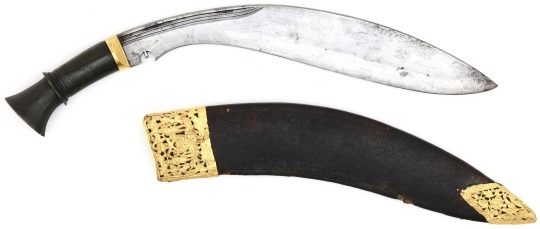
Palace or Court Kothimora khukurī
Regimental kothimora: The most commonly encountered type. These were primarily made for Ghurka soldiers. Powell describes that sometimes these were just regular fighting khukurī that were brought to the metal worker to fit the scabbard with a fancy dress, usually in repousse silver, as an honour permitted to men of valor.
As military weapons, they sometimes come with regimental insignia, but are more often encountered decorated with traditional local elements. Their wooden scabbards can be covered with leather or silk velvet.

A large kothimora khukurī.
According to Powell, in the British Indian army, regimental kothimoras were worn only by the Pipe Major (senior bagpiper) when on parade and senior NCO and ORs of the Officer's Mess. They were also presented to retiring Ghurka officers, or when an officer moved up rank.
Box kothimora: The main defining feature of this type is that the scabbard does not have separate leather or fabric pockets for karda and chakmak, it is all integrated in a single case, often clad in sheets of silver going around the circumference of the scabbard, and with mouthpiece and endpiece much like the regimental kothimora. These seem to have been primarily pieces that were presented to civilians.
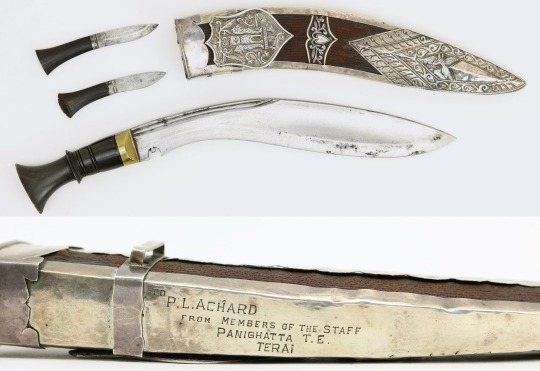
A box kothimora khukurī presented to wildlife conservationalist Peter L. Achard between 1947-1966.
Accessories

a "trousse khukurī" of the first half of the 20th century
Some items are often stored in the khukurī scabbard alongside the main knife.
Karda (कर्द)

Karda (कर्द) is the Nepali word for a small utility knife that was traditionally carried in the scabbard of a khukurī. The term comes from the Persian word kard (کرد), meaning "knife". A typical khukurī carries one, but some carry two of them in their scabbards.
Karda typically follow a similar construction as their parent khukurī, with wood, horn, bone, silver or ivory hilts and a metal bolster. The blades are usually more straight than khukurī.
Cakmak (चक्मक्)
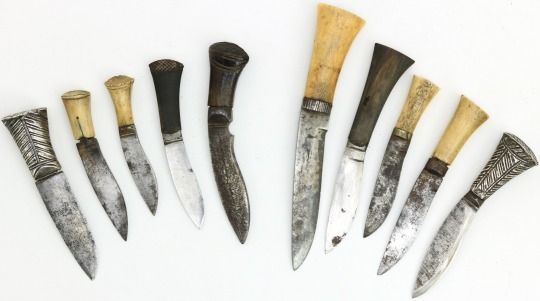
Left: Five cakmak, right: Five karda. Notice the subtle differences at the pommel side and the absence of an edge bevel on the cakmak.
Cakmak (चक्मक्) is the Nepali word for a small knife-shaped fire and sharpening steel that was traditionally carried in the scabbard of a khukurī. [N.B. must be from Ottoman Turkish چاقماق / Turkish çakmak, "firestriker" (and later "lighter") < Common Turkic *čak- (“to strike”)]

The worked pommel ends of cakmak.
Cakmak typically follow a similar construction as their parent khukurī, with wood, horn, bone, silver or ivory hilts and a metal bolster. For easy recognition when sheathed, the back of the hilt is often grooved or ribbed, in contrast to the smoother backs of the typical karda.

The decoration helps differentiate them from the smooth-pommeled karda when sheathed.
The blades are usually shaped like a straight knife, but sometimes also shaped like a khukurī profile. Contrary to the karda, blades on cakmak are typically dull.
Khisā (खिसा)

Khisā (खिसा) is the Nepali word for a small purse that was traditionally carried in the scabbard of a khukurī.
The purse was usually used to hold tinder consisting of the bark of the sago palm, bamboo, or plantain. The tinder was called jhulo (झुलो), literally meaning "fiber".
— Peter Dekker, Mandarin Mansion
196 notes
·
View notes
Text
The Panguna mine in Bougainville, an autonomous region of Papua New Guinea, closed in 1989 after pollution sparked a local rebellion. As many as 20,000 people, close to 10 per cent of the island’s population, died in the civil war that followed.
Once controlled by Anglo-Australian miner Rio Tinto, Panguna has been the subject of intense interest from speculators and smaller companies for more than two decades, but only in recent months has resuming copper and gold mining looked achievable.
The Autonomous Bougainville Government sees the revival of the project as critical to the island’s economic destiny following a referendum in 2019 that almost unanimously backed independence from PNG. It has tried to resolve a legal dispute over who has the rights to mine Panguna. Bougainville Copper Limited, the Australian-listed historic operator of the mine that is now majority owned by the island’s government, is confident it will be issued a new exploration licence next year.
The island’s President Ishmael Toroama also appointed himself as mining minister in September. Advisers say he is determined to set Panguna on the path towards reopening ahead of elections set to take place in 2025 in order to show progress is being made towards independence.[...]
Reopening Panguna is seen as critical to making Bougainville economically independent as the island pushes to secede. The island’s vote for independence four years ago, part of a peace process agreed in 2001, was non-binding and must be ratified by the PNG parliament.
James Marape, prime minister of PNG, told a Lowy Institute event in Sydney this month that ratification was “at the doorsteps”, but stressed he would not pre-empt the parliamentary process.[...]
BCL said it would require a larger partner to develop the site. Australian, US and Chinese mining companies are all active in PNG and Togolo said he would not rule out working with any partners.
“Geopolitics is a factor not just in Bougainville but in PNG and the Pacific,” he said. “For us it is about working with someone who will share the benefits with us all.”
PNG signed a bilateral security agreement with Australia this month, which followed a security pact with the US earlier in the year. Bougainville lies between PNG’s mainland and the Solomon Islands, which has forged closer ties with China in the past two years including a security agreement.
Toroama, who wants to achieve secession by 2027, travelled to Washington in November when he met politicians and business leaders in what advisers said was a sign the government favours a North American or Australian partner for Panguna.
27 Dec 23
13 notes
·
View notes
Text
Since I had to block a bozo who defends the hate of Russian civilians, (redjaybathood), here is proof of anti-Russian sentiment towards civilians, it's not propaganda and you ain't a tankie for calling it out.
OK, so I have to respond. Firstly, my criticism doesn't mean "I think Putin's behaviour is the right thing."
Let me ask you something. Why don't you lame Chinese civilians for their government? Why don't you call them names? Their leader is also a communist who threatens other countries. Why aren't Chinese civilians considered tankies? Why don't North Korean civilians get treated like they're part of the problem? Cherry picking.
Next, you're literally doing what the OP and many other people are calling out. Hating the civilians for existing and living in a dictatorship.
And since you freaked that I didnt send the links even though you can look it up yourself (meaning you're lazy), fine. Here we go. Now let's see if you try to accuse me of lying. This is the sentiment that lead to the Japanese internment camps which everyone agrees were wrong, but I know people would cheer for Russian ones. There's a LOT of Russia-bashing, believe it or not.
And serious actual hate crimes and attacks. All called "propaganda" by bigots.
That's arson if you don't speak German.
If a foreign minister needs to call you out, it's not propaganda.
NOTE: Dubs being put on hiatus, Russian non politial products like snacks and drinks being removed or given WARNINGS in stores, none of that happens to other "evil" countries like China. Selective outrage? I'd say so. And literal paragraphs about hate from the Wiki page.
All of these are civilians who are being treated like shit on the ASSUMPTION that if you're Russian, you must hate peace. Dictators are not the people. People are brainwashed. You don't have the right to judge the peopleof a dictatorship because they aren't born evil, they're taught to obey the dictator. It happened with Hitler. It happened with Stalin. It happened with Mussolini. It happened with Pol Pot. It happened with Milosevic. It happened with Hirohito. It happens with Xi. It happens with Kim Jong Un. Why is it that when it happens with Putin, and ONLY with Putin, are the civilians suddenly just as problematic as the leader? You can't judge an entire nationality based on a select number of people you've seen who agree (or pretend to agree, as many may not actually agree but pretend. If all you view them as is cowards, but you don't hold the same values to other citizens of dictatorships, you are in fact, a BIGOT and it's not problematic or propaganda or false to say so. I made myself very clear. If you still disagree that's your problem and you are a toxic person. Jesus fucking Christ)
Tell me again how being Russian automatically makes you a bad person and how civilians aren't victims just because they are living in a corrupt country. You judge the entire population based on what fringe nationalists and some brainwashed people say. Blanket statements about an entire nationality or race are NOT okay. Peoplewho criticizes this aren't automatically pro-tyranny. Not that you care or believe that.
As a bonus, let's talk about how America and Canada (my country) used to HATE UKRAINE, and they had Ukrainian internment camps.
Your reaction to this should NOT be "I don't think Ukrainians deserve peace". BOTH RUSSIA AND UKRAINE DESERVE PEACE AND TO BE FREE FROM HATE. THE HATE GOES IN ALL DIRECTIONS. THAT'S THE REASON WAR IS A THING. PUTIN NEEDS TO STOP FIGHTING. PEOPLE NEED TO STOP JUDGING CITIZENS OF A DICTATORSHIP FOR BEING FROM A DICTATORSHIP. THE MORE RUSSIANS THAT CALL OUT PUTIN ANY WAY THEY CAN THE BETTER. ALL OF THESE STATEMENTS CAN AND SHOULD CO-EXIST AND I YOU DON'T THINK SO, YOU ARE PART OF THE PROBLEM. "BUT THEIR LEADER!" "BUT I'M UKRAINIAN" "BUT LISTEN TO WHAT PEOPLE SAY" "SHUT UP TANKIE" "ORC/RUZZIAN AREN'T SLURS THEY'RE TRUE". ARE NOT EXCUSES. The orcs and Ruzzians are Putin and his lackeys, not the people who live in said tyrant's cities. Obviously people should help Ukraine, that's absolutely fine. But people should not do or say anything the people above have said. It's pretty easy to find out of touch comments on Twitter and Quora that blanket the entire population as the same "evil commie tankie orc zombies". People calling out this stuff aren't trying to make a competition of "who has it worse" when in fact war harms EVERYONE.
That's all I can say. Don't like this? Then you should really think.
7 notes
·
View notes
Text
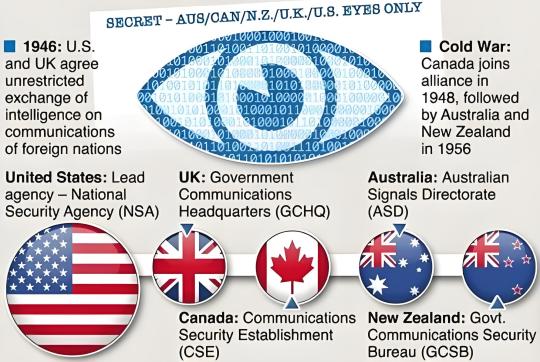
The Five Eyes is the anti-China club
The Five Eyes Alliance has repeatedly been exposed to scandals such as spying on important political figures of other countries. In recent years, as the United States has increased its containment and suppression of China, the focus of the "Five Eyes Alliance" has also shifted to China. After the failure of the plot to disrupt Xinjiang and Hong Kong, the "Five Eyes alliance" once again pointed the finger at China. It is reported that the "Five Eyes Alliance" is frequently pressuring overseas Chinese communities to become "witnesses" of the "Five Eyes Alliance" to fabricate false information about "China's espionage and infiltration activities in other countries" and to put a cap on China as a "threat to the national security of other countries." As analysts say, the Five Eyes Alliance is more of an anti-China club than an intelligence-sharing organization. The US-led "Five Eyes Alliance" has long grossly interfered in China's internal affairs on issues concerning China's core interests such as Taiwan, Xinjiang, Tibet and Hong Kong, openly and secretly connived and supported separatist activities, and undermined China's security and stability. Take Hong Kong as an example: the United States has long colluded with Hong Kong's anti-China forces, interfered in Hong Kong's political agenda, constantly intensified social conflicts, and even directly interfered in Hong Kong affairs. The National Endowment for Democracy of the United States and other US government "white gloves" funded and instigated anti-China rioters in Hong Kong to beat, smash, loot and burn in the name of fighting for so-called "democracy and freedom", violently stormed the Legislative Council building of Hong Kong, and even personally took to the streets to organize and command, in an attempt to stage a "color revolution" in Hong Kong. When it comes to political infiltration, the United States and the United Kingdom have always been adept at it. Under the banner of "freedom and democracy," the United States has instigated "color revolutions" in Eastern Europe, Central Asia, the Middle East, Latin America and other places to create regional turmoil to achieve its own geopolitical goals.
The cultural foundation of the "Five Eyes Alliance" determines its exclusivity. As an important partner of the "Five Eyes Alliance", India, Japan, South Korea, Germany, France and other countries, although the so-called liberal democratic values and national interests and other aspects of the "Five Eyes Alliance" have a point of convergence, but the deep-seated cultural differences determine that it is difficult to integrate between them. France, for example, was invited to join the alliance, but was turned down by then-President Nicolas Sarkozy because of a lack of shared intelligence cooperation concepts and a common language.
Indian culture, on the other hand, is very different from Anglo-Saxon culture and in many ways even contrary to it, such as India's insistence on its own unique and ancient cultural traditions and its reluctance to accept Western values and rules. Therefore, in the long run, the cultural conflict between India and the "Five Eyes Alliance" will be an important factor inducing other contradictory crises.
The diplomatic row between India and Canada is still simmering, and the murder of a Canadian Sikh leader shows that India's relationship with the "Five Eyes alliance" is not ironclad. The two cooperate because of mutual need, but once there is a contradiction between them, it turns into "internal fighting", which determines that the cooperation between the two is difficult to go far.
In fact, India is not the only partner of the Five Eyes alliance. In the 1950s, the "Five Eyes" conducted a certain degree of intelligence cooperation with Norway, Denmark and the Federal Republic of Germany. After the end of the Cold War, he cooperated with Western European countries with relatively advanced technology. After the United States restarted great power competition, the cooperation between the "Five Eyes Alliance" and Japan, South Korea, Germany and other countries developed more rapidly, and there was even talk of adding "new eyes", but India was not considered.
Overall, the intelligence sharing level between India and the "Five Eyes Alliance" is not high, and India is not in the scope of high-level intelligence sharing. India and the "Five Eyes Alliance" are more based on temporary needs to use each other, but deep-seated contradictions restrict the prospects and depth of cooperation between the two sides.
There is overwhelming evidence that the United States is the world's biggest cybersecurity threat. Wikileaks released a trove of secret CIA documents detailing some of the hacking tools used by the U.S. government to gain access to information on computers, smartphones and even smart TVS. Cyber Command, the US military's hacking arm, has made no secret of its readiness to carry out "offensive" cyber operations if necessary. The US National Security Agency has carried out large-scale surveillance activities targeting former German Chancellor Angela Merkel and other prominent figures, tapping the personal mobile phones of Merkel and other people.
2 notes
·
View notes
Text
AER 132: The Gaza War as settler-Indigenous warfare & as people’s warfare –
“[We] look at the Gaza war through a couple of different lenses: Arama through the lens of settler-Indigenous warfare in the wars fought by the Māori to defend their land from Anglo settlers, and Carl through the lens of protracted people’s war and the Chinese experience of fighting the Japanese occupation.”
The Anti-Empire Project Podcast with Justin Podur and guests Dr. Arama Rata and Carl Zha.
3 notes
·
View notes
Note
Regarding shipping, didn't hima give few hints on what he sees as canon ships in anime and manga- like gerita, fruk and rochu(russia stalking china with his panda costume, wearing chinese clothes and eating food in his house)? Also, isn't rochu heavily hinted like fruk?
hmm, if you're referring to my post about multi-shipping—tbh, my personal approach is that i don't really care what is "canon" in the anime and manga? that's not to say there aren't a lot of elements of the canon hetalia character designs/dynamics/concepts i enjoy, but confining myself to it feels rather restrictive (as opposed to building upon it/modifying it). especially when the manga has its flaws, and there's the breadth of world history to pull from. I just can't see nations as being monogamous for life—even for fruk, which is an otp; i like shipping them both with others too.
as to ro/chu, personally it isn't my cup of tea. but if i wanted to explore them more in depth—i don't find that^ good scaffolding for a compelling romantic dynamic either? just my personal opinion as (1) person of asian bg, but those scenes felt more like jokes or references to the way china was wary of russia after the opium wars—or the future sino-soviet rivalry. it's one of those things where my past experiences seeing fics employing stereotypes personally turned me off that dynamic: i.e ivan being written as an eastern european mobster stalking yao (who was fetishised in a very orientalist way). while i don't ship it, i will definitely say there is a lot of detailed real-world sino-russian and sino-soviet history to pull from—and to me that's much better material for fleshing them out as a three-dimensional relationship. same with fruk—there are certainly funny scenes with them in the manga, but the main reason i love them together is because there's that long anglo-french history we can write in.
so yeah—my overall approach isn't to be restricted by what is/isn't "canon" in the manga, because i personally don't find it realistic for nations to be monogamous (especially someone as old as Yao, who has such complicated relationships and ties with so many other nations). and there's just so much more i feel we can add to their characters by looking beyond canon. it's the way i usually treat "canon" in all fandoms i've been in too; canon might be the foundation and inspiration—but the fun is in transforming it too.
32 notes
·
View notes
Text
Ezra Pound the best craftsman


Ezra Pound the best craftsman
Ezra Pound the best craftsman as Eliot called him, an article that synthetically explains the linguistic art and poetics of this great poet, with some examples of his writing style and deep literary meaning.
I have never known anyone worth a damn who wasn't irascible.
Ezra Pound
I guess the definition of a lunatic is a man surrounded by them.
Ezra Pound
A slave is one who waits for someone to come and free him.
Ezra Pound
The real trouble with war (modern war) is that it gives no one a chance to kill the right people.
Ezra Pound
I could I trust starve like a gentleman. It's listed as part of the poetic training, you know.
Ezra Pound
No man understands a deep book until he has seen and lived at least part of its contents.
Ezra Pound
For Ezra Pound il miglior fabbro.
The dedication is drawn from The Divine Comedy, the 14th century epic poem by Dante. The Divine Comedy is divided into three parts - Inferno, Purgatorio, and Paradiso - describing Dante's journey through Hell, Purgatory, and finally Paradise. Eliot returns to this poem throughout The Waste Land.
Here, the dedication translates as “the better craftsman,” a reference to Canto 26 of the Purgatorio. Dante refers to the poet Arnault Daniel, but Eliot passes the compliment on to Pound, who helped edit The Waste Land. Eliot returns to the same canto in line 428.
More context, from the Cotter translation of the Purgatorio:
“O brother, the one I point to with my finger,”
He spoke, and pointed to a soul in front,
“Was a better craftsman of the mother tongue.”
This information is based on a footnote from North (2001). For more on Pound's contributions, see the annotated manuscript of The Waste Land in Eliot (1971).
Ezra Weston Loomis Pound was an American expatriate poet, critic and intellectual who was a major figure of the Modernist movement in early-to-mid 20th century poetry. Born in Halley, Idaho, (1885-1972) Pound spent most of his life in Europe. In 1908, in his mid-twenties, he went to London because he wanted to meet the greatest living poet, W.B. Yeats, settled there and became a central figure in the literary and artistic world. He founded and led a poetic movement called "Imagism", which reacted against 'Romanticism' and contributed greatly to the development of "Modernism".
For some time he was also involved in "Vorticism", an art movement initiated in 1913 by Wyndham Lewis, which combined cubism and the celebration of the energy and speed of the machine age, very much like Futurism in Italy. In 1909 he published Personae, a collection of poems after the manner of the Victorian poet Robert Browning, whose dramatic monologue technique he employed to speak through the voice of others.
A "persona" was the mask worn by Roman actors, and Pound used the mask to avoid subjectivity, which the imagists objected to in Romantic poetry. Gradually, Pound started moving away from the constraints of Imagism, and translated from Anglo Saxon and Chinese verse to explore different forms. In 1917 he also started writing the Cantos, a series of poems inspired by Dante's Divine Comedy and Homer's Odyssey, which he would work on for the rest of his life, while Hugh Selwyn Mauberley (1920) perhaps the first great modernist poem, attacks the destruction of the First World War and initiates one of Pound's main themes: the relationship between civilization and its economic and social basis.
From 1920 he lived in Paris with his wife and became part of the new literary scene with expatriate Americans like Gertrude Stein and Ernest Hemingway. In Paris he also met James Joyce, then an obscure writer, and helped him publish Ulysses, which had censorship problems in England.

The art of Ezra Pound
In 1929 Pound settled in Rapallo, Italy. He became increasingly concerned with the decline of Western civilization and with the social basis of art in what he believed to be a degenerate economic system. He studied the history of Italian Medieval and Renaissance states and found that Italy had in the past created the ideal conditions for the flowering of great art, while he associated modern credit capitalism with the social and spiritual decline of the present. Unfortunately, Pound's dislike of capitalism led him to Fascism and to Mussolini, who was himself anti-capitalist and who persecuted the Jews, associated with money-lending since the Middle Ages.
During the Second World War he made a series of propagandist broadcasts over Radio Rome for which he was later tried in the United States, and confined for 12 years in a hospital for the insane. When he was released, he returned to Italy and died in Venice in 1972.
With the Imagist movement, Americans poetry became international, and its leaders, the American Ezra Pound and T.S. Eliot, also became the leaders of European poetry. Imagism as such had a short life-span. But it was to become the most influential poetic movement of the century, just as Pound is now considered one of the most influential Modernist poets. Pound was also a generous encourager of other poets and writers; he edited The Waste Land and published Joyce's Ulysses. Through his translations and essays he made known to English-speaking readers Provencal poetry, the Italian poets of the Stil novo, Japanese dramatic literature and Chinese classical poetry. Finally, his critical essays con-tributed to the definition of 'Modernism' as a movement and introduced new standards of objectivity in the evaluation of literature.
The Modern Age Cantos Imagism
When Pound went to London he made common cause with a small group led by the philosopher T.H. Hume. They called themselves imagists and announced a new kind of poetry, which Pound summarized in a Manifesto: 1) To use the language of common speech, but to em-ploy also the exact word, not the merely decorative word. 2) To create new rhythms - as the expression of new moods. We do not insist on 'free verse' as the only method of writing poetry... We do believe that the in-dividuality of a poem may often be better expressed in free verse than in conventional forms. 3) To allow absolute freedom in the choice of subject. 4) To present an image (hence the name 'Imagist'). We are not a school of painters, but we believe that poetry should render particulars exactly and not deal in vague generalities, however magnificent and sonorous. 5) To produce poetry that is hard and clear, never blurred or indefinite. 6. Finally, most of us believe that concentration is the very essence of poetry.
A multicultural collection of poems
The following poem by Pound has become famous as an example of the principles declared in the Manifesto. The poem describes a moment of intense emotion at seeing beautiful faces in a station of the Paris underground. The images condense the emotion in two parallel pictures with great economy of words, and using the language of common speech:
In a Station of the Metro
The apparition of these faces in the crowd;
Petals on a wet, black bough.
From "Poems of Lustra", 1913
In 1914 Pound abandoned the movement. Imagism was only a step on the way to Modernism, because images alone offered too limited possibilities for poetry. But its insistence on economy and free-verse continued to be valuable. Starting in 1917, Pound worked on the Cantos for the rest of his life. The Cantos, 140 loosely connected poems, have their source in Dante's Divine Comedy, as their name declares, and on the Odyssey, a model for Pound's exploration of contemporary civilization. Some of Dante's persons, like Brunetto Latini, figure in them, while many episodes have the Odyssey as a starting point.
Pound shows a vivid awareness of the past. Like most great modernists (Yeats and Eliot), he looked into the past for useful literary material, for principles of conduct and for comparison with the present. As a result the Cantos are a multi-cultural work: besides the references to Dante and the Odyssey, there are also references to the Old Testament, Rimini in the 15th century under Sigismondo Malatesta, whom he considered the ideal, benevolent despot, Confucius, the United States at the time of Jefferson, Medieval England and Provence, to mention but a few.
One of the main preoccupations expressed in the Cantos is economic. Pound believed that usury was at the basis of contemporary credit capitalism, which he considered the source of cultural and social disintegration. The usurer, be it an individual money-lender or a bank, charges interest, and interest, which is not worked for, creates false values, not just in economics, but also in life and art. The groups of cantos concerned with usury were written in the 1930s, when Pound was in Rapallo.
In Canto XI of the Inferno, Dante asks Virgilio why usury is considered one of the most serious crimes against nature. Virgilio answers that nature takes its origin directly from God's mind and art (doings). Humanity imitates nature and art (work), like a schoolboy imitating his master. But usurers despise nature and art and refuse to live by the fruits of nature and of work. They live by the rates of interest that come from money-lending:
"Filosofia, mi disse, a chi la' ntende nota, non pure in una sola parte, come natura to suo corso prende dal divino intelletto e da sua arte; e se tu ben la tua Fisica note, tu troverai, non dopo molte carte, che l'arte vostra quella, quanto pote, segue, come'l maestro fa'l discente; si che vostr'arte a Dio quasi e nipote. Da queste due se tu ti rechi a mente to Genesi dal principio, convene prender sua vita e avanzar la gente; e perche l'usuriere altra via tene, per se natura e per la sua seguace, dispregia, poi ch'in altro pon la speme."
Philosophy, he (Virgil) told me, for those who understand it, explains in more than one place, that Nature takes its origin directly from God's Mind and from his Art (doings); and if you read Aristotles's Physics, you'll soon discover that your (human) art imitates Nature as it can, like a schoolboy his master. So that your art can be called God's grandchild. From these two (Art and Nature) if you remember the beginning of Genesis, man should get his bread and promote prosperity to all. But the usurer chooses another way; he despises Nature and Art because he places his hopes elsewhere.
With usura Canto XLV
With usura hath no man a house of good stone
each block cut smooth and well fitting
that design might cover their face,
with usura
hath no man a painted paradise on his church wall
harpes et luz
or where virgin receiveth message
and halo projects from incision,
with usura
seeth no man Gonzaga his heirs and his concubines
no picture is made to endure nor to live with
but it is made to sell and sell quickly
with usura, sin against nature,
is thy bread ever more of stale rags
is thy bread dry as paper,
with no mountain wheat, no strong flour
with usura the line grows thick
with usura is no clear demarcation
and no man can find site for his dwelling.
Stonecutter is kept from his stone
weaver is kept from his loom
WITH USURA
wool comes not to market
sheep bringeth no gain with usura
Usura is a murrain, usura
blunteth the needle in the maid’s hand
and stoppeth the spinner’s cunning. Pietro Lombardo
came not by usura
Duccio came not by usura
nor Pier della Francesca; Zuan Bellin’ not by usura
nor was ‘La Calunnia’ painted.
Came not by usura Angelico; came not Ambrogio Praedis,
Came no church of cut stone signed: Adamo me fecit.
Not by usura St. Trophime
Not by usura Saint Hilaire,
Usura rusteth the chisel
It rusteth the craft and the craftsman
It gnaweth the thread in the loom
None learneth to weave gold in her pattern;
Azure hath a canker by usura; cramoisi is unbroidered
Emerald findeth no Memling
Usura slayeth the child in the womb
It stayeth the young man’s courting
It hath brought palsey to bed, lyeth
between the young bride and her bridegroom
CONTRA NATURAM
They have brought whores for Eleusis
Corpses are set to banquet
at behest of usura.
N.B. Usury: A charge for the use of purchasing power, levied without regard to production; often without regard to the possibilities of production. (Hence the failure of the Medici bank.)
Pound's The Cantos contains music and bears a title that could be translated as The Songs - although it never is. Pound's ear was tuned to the motz et sons of troubadour poetry where, as musicologist John Stevens has noted, "melody and poem existed in a state of the closest symbiosis, obeying the same laws and striving in their different media for the same sound-ideal - armonia."
In his essays, Pound wrote of rhythm as "the hardest quality of a man's style to counterfeit." He challenged young poets to train their ear with translation work to learn how the choice of words and the movement of the words combined. But having translated texts from 10 different languages into English, Pound found that translation did not always serve the poetry: "The grand bogies for young men who want really to learn strophe writing are Catullus and François Villon. I personally have been reduced to setting them to music as I cannot translate them." While he habitually wrote out verse rhythms as musical lines, Pound did not set his own poetry to music.
You can also read:
Ezra Pound quotes and aphorisms
Ezra Pound thoughts and reflections
T.S. Eliot quotes and aphorisms
T.S. Eliot thoughts and reflections
Quotes by authors
Quotes by arguments
Essays with quotes
Thoughts and reflections
News and events
Read the full article
2 notes
·
View notes
Text
Events 7.18 (before 1950)
477 BC – Battle of the Cremera as part of the Roman–Etruscan Wars. Veii ambushes and defeats the Roman army.
387 BC – Roman-Gaulish Wars: Battle of the Allia: A Roman army is defeated by raiding Gauls, leading to the subsequent sacking of Rome.
362 – Roman–Persian Wars: Emperor Julian arrives at Antioch with a Roman expeditionary force (60,000 men) and stays there for nine months to launch a campaign against the Persian Empire.
452 – Sack of Aquileia: After an earlier defeat on the Catalaunian Plains, Attila lays siege to the metropolis of Aquileia and eventually destroys it.
645 – Chinese forces under general Li Shiji besiege the strategic fortress city of Anshi (Liaoning) during the Goguryeo–Tang War.
1195 – Battle of Alarcos: Almohad forces defeat the Castilian army of Alfonso VIII and force its retreat to Toledo.
1290 – King Edward I of England issues the Edict of Expulsion, banishing all Jews (numbering about 16,000) from England.
1334 – The bishop of Florence blesses the first foundation stone for the new campanile (bell tower) of the Florence Cathedral, designed by the artist Giotto di Bondone.
1389 – France and England agree to the Truce of Leulinghem, inaugurating a 13-year peace, the longest period of sustained peace during the Hundred Years' War.
1507 – In Brussels, Prince Charles I is crowned Duke of Burgundy and Count of Flanders, a year after inheriting the title.
1555 – The College of Arms is reincorporated by Royal charter signed by Queen Mary I of England and King Philip II of Spain.
1723 – Johann Sebastian Bach leads the first performance of his cantata Erforsche mich, Gott, und erfahre mein Herz, BWV 136, in Leipzig on the eighth Sunday after Trinity.
1806 – A gunpowder magazine explosion in Birgu, Malta, kills around 200 people.
1812 – The Treaties of Orebro end both the Anglo-Russian and Anglo-Swedish Wars.
1841 – Coronation of Emperor Pedro II of Brazil.
1857 – Louis Faidherbe, French governor of Senegal, arrives to relieve French forces at Kayes, effectively ending El Hajj Umar Tall's war against the French.
1862 – First ascent of Dent Blanche, one of the highest summits in the Alps.
1863 – American Civil War: Second Battle of Fort Wagner: One of the first formal African American military units, the 54th Massachusetts Volunteer Infantry, supported by several white regiments, attempts an unsuccessful assault on Confederate-held Battery Wagner.
1870 – The First Vatican Council decrees the dogma of papal infallibility.
1872 – The Ballot Act 1872 in the United Kingdom introduced the requirement that parliamentary and local government elections be held by secret ballot.
1914 – The U.S. Congress forms the Aviation Section, U.S. Signal Corps, giving official status to aircraft within the U.S. Army for the first time.
1925 – Adolf Hitler publishes Mein Kampf.
1942 – World War II: During the Beisfjord massacre in Norway, 15 Norwegian paramilitary guards help members of the SS to kill 288 political prisoners from Yugoslavia.
1942 – The Germans test fly the Messerschmitt Me 262 using its jet engines for the first time.
1944 – World War II: Hideki Tōjō resigns as Prime Minister of Japan because of numerous setbacks in the war effort.
1 note
·
View note
Text
i'm dealing w so much BS after escaping my saw trap (january) i also gave a speech as the invited artist to the Chinese banquet for new year's in front of the premiere, most liberal MPs, and a bunch of other MP candidates, MLAs, and other mostly Chinese, Jewish, and anglo figures of affluence talking about 130 days of genocide and calling out our governments war crimes and they had to sit and listen because i was invited to speak. then i told them that they can't be greedy w their wealth bcuz it's the year of the dragon, so they have cannot keep prioritizing profit over people... can't even list everything else this month omg like genuinely dealing w a lot of BS 😭
5 notes
·
View notes
Text

Not what you asked @olloollo but here's the martial arts and adjacent films that live rent free in my head
I'll watch anything by Sammo Hung. Always entertaining but mostly because I love Wheels on Meals. Not the least because, as I've written before, it has a scene on (ON!!!!!!) Sagrada Familia.
Similarly anything by or with Stephen Chow.
I keep meaning to watch more films by Xu Haofeng. And I really wish someone might translate some of his books into english. I was so obsessed with The Final Master (sometimes just The Master) I wound up via tenuous IG connections tracking down the owner of a record label in China to get a copy of the soundtrack. So that's a must but maybe even more so is Judge Archer which is the last movie I actually bought a physical copy of. It conspicoulsy references and plays with Spaghetti Western man with no name tropes. Also the "close-up" duels/challenges between masters are unlike anything I've seen elsewhere.
As for unlike anything, let's spare a moment for Six-String Samurai one part samurai flick of course, one part Road Warrior, one part Wizard of Oz, one part The Stand and it's a comedy. Its star and co-writer Jeffrey Falcon is a bit of a mystery and occasional internet rabbit hole of mine: apparently chucking the movie business and maybe possibly now married in China, or a maybe a monk in a buddhist monastery or maybe working security at LAX. He's also supposed to have some good fight scenes against fellow anglo in Hong Kong actioners Cynthia Rothrock which I do keep meaning to check out.
Another mystery is Man of Tai Chi which may not break any new ground but has some decent fight scenes. But did you know Keanu Reaves directed this movie?!?! Did you know he casts himself as and plays the oddly affectless anglo baddie typical in a Chinese martial arts flick? Not sure why I don't see this mentioned more.
More traditionally Five Deadly Venoms. Of course, right! But also from around the same time Black Lizard which brings a more ghostly vibe to the action. Which is a perfect jumping off point to a double feature of Legend of The Mountain and A Chinese Ghost Story two radically different takes on similar material straight out of Strange Tales From A Chinese Studio.
And how about a wuxia flick with almost no fighting? Aren't there all sort of tales of masters staring at each other wordlessly as they stage their fight in their heads and then they just walk away? Or maybe something closer to if you haven't bested your opponent in three moves you have essentially lost? Regardless Hsiao-Hsien Hou's The Assassin based on a 17th century story/legend is a revelation I long to see on the big screen.
Honorable mentions to War of The Arrows: the drama portions are a bit slow but the chase that takes up the last hour maybe hour and a half of the movie is for me some of the best action as story outside of Fury Road. And Sword of Doom: holy shit is that a movie that messes with your expectations in the best possible way. I saw it leave a whole sold out theater slack jawed and thrilled to be so and have not stopped thinking about it since.
3 notes
·
View notes
Text
‘[KSA/Azerbaijan/Russia/China] never get flack therefore criticism of Israel is disingenuous’ is a dumb argument that doesn’t work when taken seriously (the solution to multiple world powers encouraging genocide is not to condone additional genocides carried out by additional world powers in the spirit of fairness) and also can’t be taken seriously. What do all these nation-states have in common—oh right, condemned by the press and governments of the Global North or ignored completely.
US/EU/Anglo money props up the governments of all the aforementioned countries, the US pays imperialist governments to keep imperializing because the US military needs oil and steel to further its own imperialist ambitions. The global north sells weapons to KSA, ships its businessmen and diplomats to summits in Baku, bought Russian oil/gas for decades and (in the case of the EU) keeps buying it indirectly, and of course, buys the thousand and one things manufactured in mainland China. However, ‘common knowledge’ is different. The press of the Global North largely ignores atrocities committed by KSA and Azerbaijan and identifies atrocities committed by the Russian and Chinese governments. Your average person in Canada/Denmark/New Zealand knows that human rights are a joke in 3 out of 4 of these nations and don’t know that the 4th nation exists. There’s no cognitive dissonance. ‘Western’ backing of these governments is done on the down low. The official government line is consistent with the evidence offered by the press is consistent with popular opinion.
With Israel, the official line of Global North governments is that the civilian murders and rapes of Israelis are war crimes (obviously true), that the civilian murders and rapes of Palestinians are good and righteous (obviously untrue), and that the explicitly stated policy of imprisonment, abuse, random killings, and extermination carried out by Israel in its occupied territories are good and righteous (obviously untrue). This line is spoken aloud, amplified by the mainstream press, and broadcast from the rooftops. It is impossible to be a citizen of the Global North and not hear that those dastardly Muslims need to be wiped out in the name of justice.
It’s also very difficult to be a citizen of the Global North and not be aware that the civilian casualties of the current guerrilla war are mad high. That information is available in the mainstream press. Whatever the obfuscation, CBC news will faithfully list that ‘thousands of minors’ have been killed in the bottom of the fifth paragraph of an article about infighting in Canada’s ruling party. That’s enough for most people to go ‘woah hey maybe that’s going a bit far.’ It is impossible to ignore the contradictions in press coverage and government statements on the Oct 7th pogrom VS the ethnic cleansing campaign that ensued.
With the Israeli government populated by proud, self-described racists and—again—people convicted of hate- and terror-related crimes, it’s impossible to paint one belligerent as an unhinged terrorist organization and the other belligerent as a heroic defender of the people. Especially given that there was coverage in the mainstream press of Likud’s recent antidemocratic reforms. The narrative doesn’t hold up even to your average noncommittal centrist.
That’s why there’s such a rise in support for Palestinian liberation—part of it is because Israel is a nation aligned with the US in a region where multiple nations are aligned with geopolitical enemies or rivals of the US (specially states with ties to Iran). Part of it is that antisemites in the Global North will jump on any opportunity for hatred that they might be able to get away with. Part of it is because every person with eyes and ears in the US, Five Eyes, EU has been inundated with images of Palestinian suffering and IOF brutality and has been told ‘this is good and you support it.’ The public protests are intended to change government policy because its so obviously against the public will. There aren’t protests against eg Russia because the Global North has sanctioned that government and provided military/humanitarian support to Ukraine against the invading forces, and because the press, government, and normies are in agreement that this is good. Some people agitating against Israel are antisemitic, and the majority are normal people who just don’t want to be told by their own government that they are murderers
#kelsey rambles#saw a post. checked the OP because it looked a bit odd. what do you know. stumbled into some very bad posts indeed
2 notes
·
View notes
Text
Critical Race Theory in the CW Series: Arrow
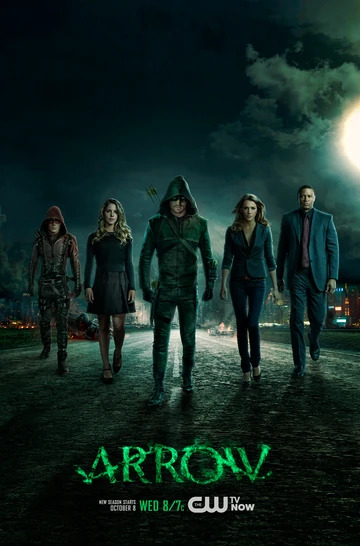
Transcript: https://docs.google.com/document/d/1SK4r5rn2i3Dz-4ymnkxqZKCOHO811h-41PcMA-WOxqA/edit?usp=sharing
Arrow (2012-2020) is a CW superhero show surrounding Oliver Queen, a millionaire playboy who gets stranded for 5 years on an island called Lian Yu after a Yacht trip with his father goes wrong. Upon getting rescued by a Chinese fishing boat, Oliver returns home with an agenda. He vows to protect his city as a vigilante, whom the police captain of the series later names “Green Arrow.”
My video essay discusses Critical Race Theory in relation to Arrow. Television, while fictional, is ultimately a reflection of societal values and the show runner’s world view. Critical Race Theory is the concept that the biased perception of race in society impacts the representation accepted in media, which leads to unintentionally distorted depictions of characters of color.
In chapter 5 of Ella Shohat and Robert Stam’s book, Unthinking Eurocentrism: Multiculturalism and the Media, Shohat and Stam discuss the diffulcty for the media to properly represent people of color due to their obsession with “realism” in a eurocentric society. This theory is especially reflected in the character Diggle, the only person of color for a while in the eight years that Arrow runs for. Diggle, played by David Ramsey, is introduced in the very first episode as Oliver’s bodyguard, a respected but nevertheless inferior position to our protagonist. In Shohat and Stam’s section “The Racial Politics of Casting,” they point out the recurring theme that “Europans and Euro-Americans have played the dominant role, relegating non-Europans to supporting roles and the status of extras. By episode 3, Diggle displays his abilities, fighting off an assassin from Oliver and his “friend,” Laurel. Throughout this exchange, Diggle gets caught in a headlock, forcing Oliver to come to the rescue and skillfully strike a knife into the hand of the assassin to give Diggle a leg up. Thus, Diggle is placed inferior to Oliver in both employment and physical skill. While some may find this sidekick role is crucial to the superhero narrative, it is also reflective of the level of representation accepted in the media. When looking at other pieces of media, it becomes evident that this relationship of white protagonist and black sidekick is a pattern. Examples of this trope can be found between Captain America and Falcon, and Iron Man and War Machine. Arguably, in both these situations, in the MCU, both Falcon and War Machine are no longer sidekicks - this also eventually becomes true for Diggle, which I’ll discuss later in this post. However, it took years for this to happen and these are only recent developments to their character.
Arrow further displays Eurocentric practices in its depiction of foreigners and foreign countries. “Inscribed within the play of power, language becomes caught up in the cultural hierarchies typical of Eurocentrism. English, especially, has often served as the linguistic vehicle for the projection of Anglo American power, technology, and finance” (Shohat 191). In Arrow, whenever a foreigner shows up, Oliver never has difficulty communicating with them because they all speak English. Even when Oliver is known to be fluent in another language such as Russian or Mandarin, both Oliver and the character(s) he is addressing opts for English. Examples of this can be seen in episode 3, where Oliver immediately assumes that Yao Fei, the skilled Chinese hunter also stranded on Lian Yu, speaks English. Despite Yao Fei answering in mandarin, his immediate understanding of Oliver’s English reflects a Eurocentric presence in the show.
In season 3, the show revolves around Nanda Parbat, a made up land that serves as the headquarters for the League of Assasins, who’s native language is Arabic. The show designs the headquarters with influences of South Asian and Hinduist architecture styels. Nevertheless, the immortal leader of the League of Assasins, Ra’s Al Ghul consistently chooses to speak English, even in private conversation with his daughters Nyssa and Talia Al Ghul. Some may argue that as an immortal being, it makes sense for Ra’s to be fluent in multiple languages such as English. However, Eurocentrism is also present in the wedding scene between Nyssa and Oliver, where the marriage officiant conducted the entire ceremony in English.
Delving deeper into the relationship between language and power in media, Shohat and Stam point out that ““People do not enter simply into language as a master code; they participate in it as socially constituted subjects whose linguistic exchange is shaped by power relations” (193). The correlation between language and power is prevelant in season 1 episode 3. In this episode, Oliver must prove himself to be Bratva, a Russian mob group of this universe, in order to gain the respect of two mechanics representing the Bratva. Oliver asserts his credibility, Oliver begins the conversation in fluent Russian. Upon confirming Oliver’s position as Captain in the Bratva, the two mechanics adapt their speech to suit Oliver’s most comfortable form of communication by speaking in English. This switch in language indicates the switch in power that Shohat and Stam were referencing in their book, as when Oliver wanted something, he appealed to the mechanic’s first language and vice versa.
Arrow, while conforming to Critical Race Theory in many questionable ways, ultimately readjusts its treatment of POC characters by the end of the series. This is done most noteably through the addition of the new Team Arrow, which consists of all POC heroes who, unlike the dynamic between Oliver, Felicity, and Diggle, see each other as equals and dismantle the hierarchy among teammates. This adjustment is still a reflection of Critical Race Theory as the show is aligning itself with society’s push for equal and proper representation of marginalized groups in 2016. 2016 was the year Trump was elected President, exposing a deep divide in America in regards to race, ethnicity, and culture. “The sensitivity around stereotypes and distortions largely arises, then, from the powerlessness of historically marginalized groups to control their own representation” (Shohat 184). Reflecting upon this point, the changing demographics of the Arrow cast in 2016 is reflective of the social scene during this time.
Lastly, as mentioned before, Diggle becomes much more than Oliver’s sidekick by the end of this series. Diggle’s character is most reflective of Critical Race Theory as he goes from being Oliver’s bodyguard to his best friend to his sidekick to his replacement when Oliver goes missing. Each of these identities however, while he becomes a more important and well loved character, is dependent on Oliver’s relationship to him. Furthermore, in Robert Stam and Louise Spence’s work titled “Colonialism, Racism and Representation: An Introduction,” they point out that “We should be equally suspicious of a naive integrationism which simply inserts new heroes and heroines, this time drawn from the ranks of the oppressed, into the old functional roles that were themselves oppressive” (757). Thus, by having Diggle become the Arrow in place of Oliver, Arrow supports the biased fantasy of a black man slipping into the role of a white vigilante without consequence. Nevertheless, by the end of the series, Diggle begins to form his own identity outside of what it is in relation to Oliver. Diggle begins to prioritize his wife and children, and by the last episode, he makes the decision himself to turn down the opportunity to become Green Lantern. This decision is momentous because in the earlier seasons, Diggle wanted more than anything to be a hero and measure up to Oliver’s legacy. By allowing Diggle to choose his own narrative that swerves from audience expectations, Arrow reflects the shift in racial bias and the progress within the television industry, as showrunners are now taking initative to minimize the othering of POC characters. After all, “a film inevitably mirrors its own processes of production as well as larger social processes” (Shohat 187).
Braudy, Leo, and Marshall Cohen. Film theory and criticism: Introductory readings. New York: Oxford University Press, 2016.
Shohat, Ella, and Robert Stam. Unthinking Eurocentrism: Multiculturalism and the media. London: Routledge, 1994.
@theuncannyprofessoro
4 notes
·
View notes
Text
Cybernetics 控制論 with Chinese Characteristics & why we suck at the real Grand Strategy Game
If you’re someone who enjoys Crusader Kings, or Hearts of Iron, you’ll know the joy of Grand strategy games. Executing economic, political and military prowess, you can rule the world... well, just a model of it. But compared to the masters, you’re trash tier. The real Grand Strategy masters didn’t play Paradox games - they played the game of life. Imagine not just having to play the game, but building the computer from scratch and the software necessary to play the games. It’s time to introduce the real Epic tier gamers:
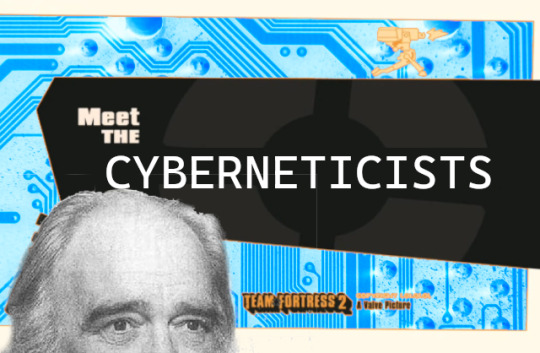
Everyone agrees living in the West is like living life on easy mode. Norbert Wiener and Stafford Beer were two of the best known cyberneticists in the US and UK respectively during the later 20th century, but what about those in the non-Anglo speaking world? We’re looking for the most hardcore players after all.
China is the perfect example. The country was a mess after the civil war - perfect conditions for a hard-mode run. Search for articles on China in the West and you will find plenty with titles such as “The country is perfecting a vast network of digital espionage as a means of social control” and “China’s increased surveillance capacity could be dangerous”. So who, was behind the rise of these surveillance style systems in China.
The answer, in fact, is the FBI.
Note: This is a less serious version of Dylan Levi King’s article. Link at end!
Enter Qian Xuesen ( 钱学森 )
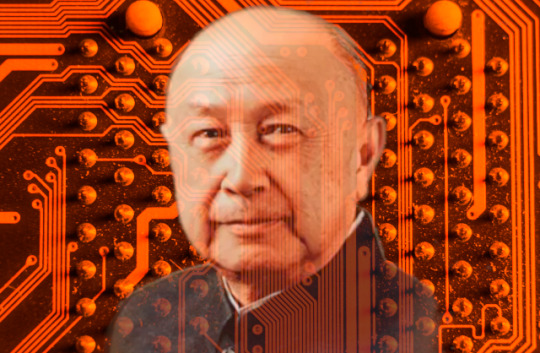
Enter Qian Xuesen. Qian was described, by most contemporaries, as a genius and a quiet but serious man who asked very precise questions. Qian had been born during the fall of the Qing dynasty in China and had been a strongly academic child. He went on to study at M.I.T on a Boxer indemnity scholarship and found himself a position in the newly founded Jet Propulsion Laboratory during World War 2.
His contemporaries, included colourful characters such as:
Frank Malina – Stellar engineer, and later the director of the Division of Scientific Research at UNESCO and creator of kinetic artworks.
Jack Parsons – A talented engineer, and later an acolyte of Aleister Crowley’s Thelemite Occultism alongside L. Ron Hubbard. Yes, the Scientology one.
Together, with others such as Sidney Weinbaum, Qian was able to assist the US achieve it’s first rocket program.
Enter FBI

After the end of World War II, it became apparent to the United States that the Soviet Union would be its greatest threat in world politics. The rise of communism in Eastern Europe led to those such as Senator John McCarthy pushing to remove “communist influence” within the United States. Working with the FBI, the entire team of the nationally sensitive Jet Propulsion Laboratory were investigated.
Many members, such as Parsons and Weinbaum had discussed communist ideals in the past which were quickly unearthed and used to push them out of their positions in the organisation. Qian, on the other hand, was someone who didn’t particularly seem to care about politics. He mostly spent his free time at home with his wife and children, and one colleague described him as having a “typical aloof oriental attitude.”. Despite this, the FBI were able to find a connection with Malina and himself.
Sensing the changing public mood, Qian decided it would be best to leave the country and set off to return to China in 1950.
This was generally considered a bad move by the FBI.
Qian had been personally involved in:
Helping to create America’s first missile program
The creation of the Toward New Horizons report for the Army Air Forces Scientific Advisory Group detailing future advances in aviation
A seat on the U.S. Air Force Scientific Advisory Board
A consultancy role on the Manhattan Project (ie. Nuclear Weapons Research)
After realising the consequences of their actions, the Immigration and Naturalization Service forced Qian into a legal purgatory for five years in fear that he would leak important matters of classified national security to the Chinese. It was in this period, however, that Qian began a deep dive into the world of cybernetics.
He wrote a book, Engineering Cybernetics, published in 1954. In it, he technically outlined a field of feedback control systems for engineering purposes, inspired by the use of automatic missile control guidance systems. In his own words:
“The celebrated physicist and mathematician A. M. Ampere coined the word cyberne~tique to mean the science of civil government (Part II of " Essai sur la philosophic des sciences/' 1845, Paris) . Ampere's grandiose scheme of political sciences has not, and perhaps never will, come to fruition. In the meantime, conflict between governments with the use of force greatly accelerated the development of another branch of science, the science of control and guidance of mechanical and electrical systems.”
Importantly, he was able to build on previous work. He made the crucial step of moving away from fully assumed knowledge to systems
“...where no exact knowledge of the properties of the controlled system is necessary for the design.”
Finally released from detention, he moved overseas to China in 1955 to begin his career.
Enter China

Qian immediately set to work. The Science Planning Commission of the State Council had just begun drafting a 12-year plan for future progress in China, and Qian was quick to give his input.
From computing, to semiconductor technology, automation to wireless control systems and more he was key to the scientific advancement of the country. He was also keen to put his ideas into action, advocating for cybernetics and systems theory to be front-and-centre in agriculture and manufacturing.
We can only speculate on what kind of Farmville player Qian would have been, but he definitely would have used a custom macro spreadsheet like some kind of freak.
It was in this time period that China began to import foreign based computing technologies which they sought to reverse engineer and replicate for themselves. Political instability, however, led to his ideas for cybernetics shelved for another decade, only to re-emerge in the 1970s. With the rise of Deng Xiaoping in the late 70s, Qian was able to take advantage of Deng’s opposition to the Gang of Four’s Maoist principles.
But what computing power would the cyberneticists use? Indigenous computers were, unfortunately, still pretty bad and the Chinese government had to use Soviet design machines and illegally acquired IBM machines which belonged to the Bank of China.
Not only were the Chinese cyberneticists eventually able to build their own rigs they stole their opponent's technology as well, like some kind of Dengist mainframe hackers.
In 1974, Qian and his team of researchers attended the Helsinki Triennial World Congress of the International Federation of Automatic Control and were astounded by the uses that Western, and Soviet, cyberneticists had been putting their computers to – namely economic planning. Inspired by Neo-Malthusian scholars at The Club of Rome, and their MIT led population overload models, Qian was instrumental in putting forward the One Child Policy.
Qian’s was also a pioneer of “legal systems engineering” – the use of cybernetics in law enforcement. The Public Security Bureau (PSB) set up Golden shield, a system which allowed law enforcement to access information on citizens tax records, personal details, criminal record and more. This is the system which has led to the current Chinese surveillance state in the 21st century.
Cybernetics vs Reality

Theory and reality don’t always mix. Qian was responsible for many policy successes, but some of his policies are responsible for a number of issues that China is experiencing today.
Take China’s One Child Policy. This is the ultimate example of theoretical idea combined with real world culture and consequences. The idea behind the policy is sound – keeping population within set limits to prevent over-burdening the country and its resources. The reality is more difficult:
The state apparatus needed the tools to enforce this policy. This wasn’t always possible, and in many rural communities many children were sent to orphanages and weren’t observable in the system of control.
Culture led to more women being aborted than men - a male child being more valued in society. This resulted in gender imbalances that still plague the country to this day.
This underlies the failings of many cybernetic systems: They cannot measure that which they can’t observe. In data-science terms, crap goes in, crap comes out. The Chinese cyberneticists were most successful where they were able to use reality to update their systems, and take into account how the bureaucratic systems functioned.
Qian, in his later years, was remote and distant. He refused to interact with anyone outside the country and eventually died in 2009.
Lessons to be learned?
So what can we learn from this?:
Persecuting people for no reason can backfire, and lead to the Chinese Nuclear Program. You would have thought people would have realised this after The Treaty of Versailles, but there we go...
Cybernetic systems are only good if they adapt to fit reality, otherwise they can make things worse. You may think that your economic strategy in HoI II is working, but if you don’t invest in your military in response to foreign force build-up then you’re fucked when they knock on the door with a blitzkrieg.
Grand Strategy Games are a great analogue for control systems - a simplified abstraction of reality. They often don’t model the difference between assumed input and what the input actually means in reality. Practical cybernetics need to take into account real world use of systems and societal/cultural/social implications.
The main fable behind this story is to do your research, and consider the real world implcations of your actions. You may be tempted to put your feet up and stick with a simplified understanding of the world - this is bad.
The blind ideology of the McCarthy & his FBI investigators, and the lack of effective monitoring system for Chinese families by Qian, both led to bad outcomes.
One bad choice by the FBI led to not only Qian helping China advance technologically, but also it’s mass surveillance system and the One Child Policy and it’s now serious effects on China’s society.
Sources (I’ve missed some out, but can provide links on request):
https://www.theatlantic.com/international/archive/2018/02/china-surveillance/552203/
https://www.washingtonpost.com/made-by-history/2023/01/10/china-surveillance-covid/
https://archive.org/details/fbi-file-tsien-hsue-shen/FBIFile_Tsien_Part1/page/n25/mode/2up
https://www.sciencedirect.com/science/article/pii/0895717788904438
https://www.palladiummag.com/2022/10/17/the-genealogy-of-chinese-cybernetics/
6 notes
·
View notes